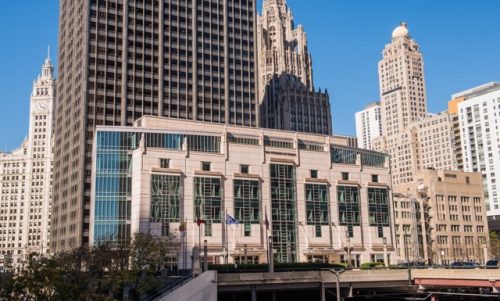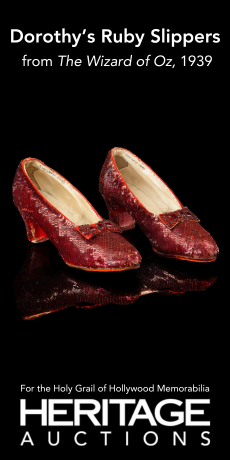BY ELIZABETH RICHTER
Where would one find the senior clerk of the Cook County Property Tax Appeals Board, a retired insurance executive, a musician/composer, an aeronautical engineer, a French lawyer, and a student from rural China around the table in the same room? I was fortunate to be part of this unusually diverse group, plus twelve others, who spent three hours on a Thursday evening last fall discussing the text and context of Shakespeare’s Hamlet.
Such an unlikely group is actually quite common at the downtown Gleacher Center, home of the University of Chicago’s Graham School of Continuing Liberal and Professional Studies, a long name for the U of C’s school of adult education.
The Hamlet gathering was part of a course with the tantalizing name Cannibals, Magicians, Bastards, and Others: The Renaissance as an Age of Discovery. Led by Professor David Bevington, with the imposing title of Phyllis Fay Horton Distinguished Service Professor Emeritus in the Departments of English and Comparative Literature and Chair of Theater and Performance Studies at the University of Chicago (where he has taught since 1967), the class was a pure delight. “Call me David” was Bevington’s opening request as he guided us through the impact of the Reformation and the exploration of the New World on the writings of Shakespeare, Christopher Marlow, John Donne, and Thomas More.
The class is part of the Graham School’s Master of Liberal Arts degree (MLA). Many working professionals pursue continuing education to boost their credentials. The MLA is designed to do more—to stretch one’s perspective in the liberal arts, sharpen writing skills, and, most importantly, introduce new disciplines and the relationships among them.
I had decided to give my brain a boost with the MLA, attracted by the flexible schedule and eminent professors. Full time, one can complete the degree in a year or take one course a quarter and up to five years to complete the degree. The University of Chicago prides itself on the discussion format, so one can’t doze through lectures! We are challenged to read closely, analyze context, and share our insights with our fellow students and challenge theirs.
“Challenged” certainly describes my case. Having written in a variety of formats professionally, I approached my first paper with great confidence. Exploring humor in Hamlet, I quickly discovered, however, that literary analysis was not one of my skills. With great patience, David helped me sharpen my ability to read closely and express myself in new ways.
My course on the Renaissance fulfills the Humanities requirement. One must also take a biological science, a physical science, and a social science course, plus four electives, including one with a non-Western focus, and write a final thesis.
This quarter, I’m fulfilling the physical science requirement with a class called Models of the Universe. From Ptolemy to Copernicus to Stephen Hawking, we’re learning about the fascinating history of how human beings have tried to understand the heavens over the centuries.
Professor Edward Kolb (“Call me Rocky”) is taking us on a surprising journey—surprising because I, with no math or science background to speak of, approached the course with more than a little trepidation. After all, Rocky is the Arthur Holly Compton Distinguished Service Professor of Astronomy and Astrophysics and Dean of the University of Chicago Physical Sciences Department (the MLA courses are taught only by tenured professors). Turns out Rocky could do stand-up comedy—he’s great at making the subject accessible to all of us.
Two sessions focused on Galileo, the brilliant 17th century Italian astronomer who discovered, among other things, the moons of Jupiter. Summarizing Galileo’s misfortunes with the Roman Catholic Church, Rocky offered the elegant equation:
GENIUS + IMPLACABILITY – HUMILITY = TROUBLE
Rocky didn’t just assign us Galileo’s satiric Dialogue Concerning the Two Chief World Systems to read, he brought a box of costumes to class so we could act it out.
Taking roles of the characters in the Dialogue, my classmates ensured that we appreciated why Galileo’s sarcastic put-downs of his critics led to his trial by the Inquisition.
I doubt that any of us will forget the trial itself, as Rocky also assigned students to read the parts of Galileo and his hooded Inquisitor.
Rocky appreciates the insights he gets from his MLA students. Lawyers, for example, have given him new perspectives on details of the Galileo trial. And he welcomes the riskier questions his MLA students ask: ”Many just want to learn. They are not worried so much they need an A to get into medical school. . . . They aren’t afraid to ask what they might think are stupid questions.”
Coming up this quarter: Newton, Einstein, and Hawking, who will no doubt provide opportunities for me to ask a stupid question!
What’s available for next quarter? The choices couldn’t be more different: Pursuits of Happiness in Chinese Cinema, Resolving the Environmental Crisis, Twentieth Century American Fiction, and more. All so intriguing!
My classmate, Paul Davé, has a special reason for taking the MLA. As Director of User Services at the U of C Computation Institute, he felt he had missed out: “I’ve always had an interest in Eastern Philosophy, but have had very limited opportunities to take liberal arts, always studying applied subject matter. . . . There’s nothing like learning with people who have spent their lives on these topics! It’s great to be in a new ecosystem!” He’s planning to take Professor Wendy Doniger’s class, The Ramayana in Indian History, in the spring quarter.
Designed to appeal to professionals in many fields, the Graham School also offers degrees in such areas as Biomedical Informatics and Analytics, professional development certificates on topics like clinical trials and integrated marketing, and a robust variety of opportunities to immerse one’s self in the liberal arts.
Its popular Basic Program grants a four-year certificate that focuses on the foundations of Western political and social thought. Also taught using the Socratic method of discussion and debate, courses range from Aristotle to James Joyce. Requiring no tests, papers, or theses, the Basic Program epitomizes the mission of the Graham School.
The Graham School engages curious adults outside the classroom, as well, through Know Your Chicago. Behind-the-scene themed tours and lectures provide insight into the workings of the city and encourage civic engagement. Past tours have included Chicago’s Haitian community, new affordable housing developments, and sustainable manufacturing.
What better way to escape Chicago’s subzero February than to explore the Graham School’s offerings and curl up with one’s MLA homework? For more information, visit grahamschool.uchicago.edu.
Elizabeth Richter is a strategic communications consultant and member of the Graham School’s Advisory Council.




















